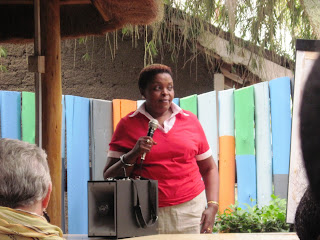


The Pros for Africa trip was a major success. During the three day campaign, we operated two medical clinics, one in Gulu and one in Atiak, fitted and distributed hearing aids with Starkey's Hearing Foundation, dug water wells with Restore International and Water4, helped in construction of Mercy's Village International, a primary school located in the bush outside of Gulu, and played soccer and football and shared love with many Ugandan children. I was stationed in at the medical clinic in Atiak all three days, so I did not get to participate in a number of the events, but each evening we would discuss the days events as a large group at dinner, and there is no doubt that we touched many local lives as well as transformed many volunteers' perception of life and purpose.
Between the two medical clinics and the hearing aid fittings, we treated close to and maybe over 3,000 patients. With the dedicated and hardworking medical team in Atiak, I'm pleased to say that we left no patients who came to our clinic without treatment. There was a larger patient flow in Gulu, but fortunately, those patients that were not seen in the three days have access to the St. Monica Medical Clinic in Gulu five days per week year round, whereas in Atiak we only operate our clinic on Saturdays due to funding and infrastructure limitations. God willing, with in the year we will build a permanent medical clinic in Atiak providing reliable access to medical care for the very neglected population.
Personally, last week was a blessing beyond measure because I also got to spend the time with my mother, whom I hadn't seen in almost three months. My mom is an RN so she was a member of the medical team going to Atiak with me. It was really special introducing her to my life here. She is more relaxed and feels more secure with my presence here now that she has witnessed firsthand the love and welcoming nature of the people, especially all of the sisters and St. Monica girls whom I'm blessed to have strong relationships with.
Sending the Pros for Africa team back to Oklahoma was challenging for me. I'm not ashamed to admit that a small part of me wanted to stow away in my mom's suitcase and join them, but as soon as I returned to St. Monica's I was reminded of why I love this place so much. Some of the girls came up to me when I got back and hugged me with giant smiles saying they were so happy that I was still here because they thought I was leaving for good with the rest of the visitors. I knew then that I was not ready to leave this life just yet.
At the last dinner with the Pros for Africa team, I was reminded of the moment my grandma told me about Pros for Africa and my thoughts of how amazing it would be to be a part of the next trip… I never imagined a year ago that I would not only be a part of Pros for Africa, but I would be living in Uganda with Sister Rosemary and the girls for four months.
I'm so grateful to Reggie Whitten and Pros for Africa and of course, God, for this opportunity of a lifetime.






